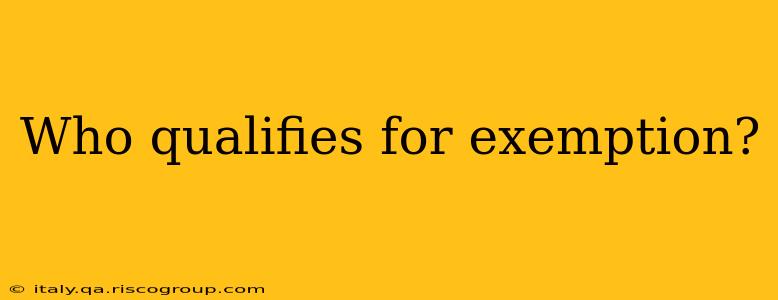Who Qualifies for Exemption? A Comprehensive Guide
Determining who qualifies for an exemption requires understanding the specific context. Exemptions exist across numerous fields, from taxes and military service to legal proceedings and specific regulations. This guide will explore the general principles governing exemptions and offer examples to illustrate the diverse applications. It's crucial to remember that the specifics of qualification always depend on the type of exemption being considered. This is not legal advice; always consult with a relevant professional for personalized guidance.
Understanding the Concept of Exemption
An exemption, in its broadest sense, signifies freedom from an obligation, duty, or requirement that applies to others. This freedom is typically granted based on specific criteria outlined in laws, regulations, or policies. The process of determining eligibility usually involves demonstrating that you meet the predefined conditions for the exemption.
Key Factors Determining Exemption Eligibility
Several key factors often determine eligibility for an exemption:
-
Specific Criteria: Each exemption has its own unique set of criteria. These criteria are precisely defined within the governing regulations and may include factors like age, income, disability, religious beliefs, or specific circumstances.
-
Documentation: Providing appropriate documentation is usually essential. This might include proof of income, medical records, religious affiliation certificates, or other relevant evidence.
-
Application Process: Most exemptions require a formal application process. This process will vary depending on the type of exemption and the governing authority. Instructions and forms are usually available through the relevant organization or government agency.
-
Review and Approval: Applications are often reviewed to ensure that applicants meet all eligibility requirements. The review process can take time, and approval is not guaranteed.
Examples of Common Exemption Types
To illustrate the breadth of exemptions, let's examine several key areas:
1. Tax Exemptions: Tax exemptions often relate to income, property, or sales taxes. Eligibility often depends on factors like income level, charitable status, or specific investments. For example, certain charities are exempt from paying income taxes. Individuals may also qualify for property tax exemptions based on their age or disability.
2. Military Service Exemptions: Conscientious objectors or individuals with specific medical conditions may be exempt from mandatory military service. These exemptions require demonstrating genuine reasons for not participating, usually with supporting documentation.
3. Legal Exemptions: In legal proceedings, certain individuals or entities may be exempt from certain legal requirements or responsibilities. For instance, journalists may have exemptions related to the protection of sources. Businesses might be exempt from certain regulations based on size or industry.
4. Educational Exemptions: Students may qualify for exemptions from certain fees or requirements based on financial need, academic performance, or disability.
5. Regulatory Exemptions: Many industries have specific regulations, and businesses may qualify for exemptions from these regulations under certain circumstances. This often involves demonstrating compliance with alternative standards.
The Importance of Thorough Research
Determining whether you qualify for an exemption requires careful examination of the specific rules and regulations that apply to your situation. The information provided here is for general understanding and should not be considered a substitute for professional advice. Always consult relevant legal professionals, tax advisors, or other specialists to ensure accurate and up-to-date information. Thorough research is critical to avoid potential penalties or missed opportunities.

